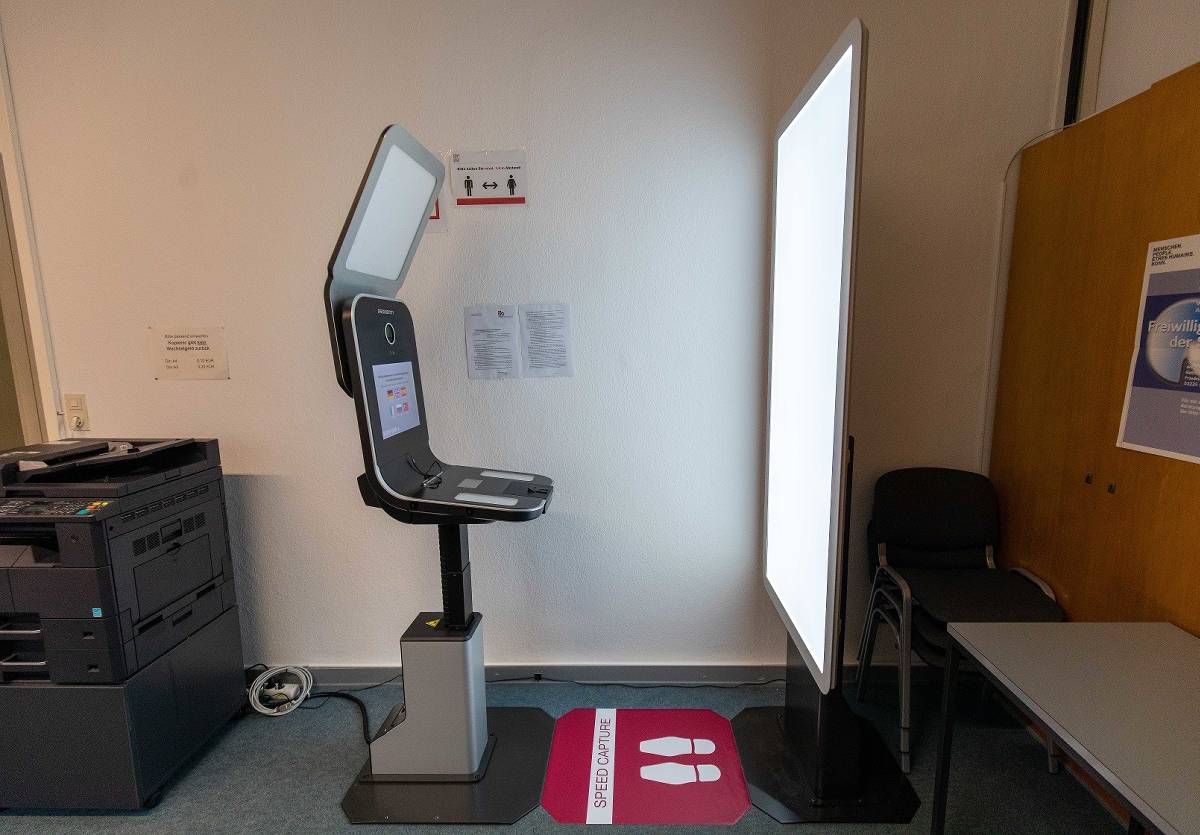Citizen Service in Godesberg City Hall New ID card now to be ordered on a touchscreen
Bad Godesberg · The Bonn city administration is using a self-service terminal in Bad Godesberg city hall. The branch offices in Beuel and Hardtberg are to follow shortly. Data protection is guaranteed, according to the city.
The device in the waiting area in front of the citizens' office in Bad Godesberg's city hall looks a little futuristic. A vertical panel in front of a self-service terminal shines brightly. Between light and terminal citizens can make their biometric passport photos and signatures for new identity cards, as reported, since the beginning of the year. However, it can take three attempts for small people to find the eye level of the photo motif.
In the very first step, the machine's large touchscreen provides information about the colorful bouquet of passports and forms that can be equipped with the photos and signatures captured here: ID cards, passports, drivers’ licences, residence permits and many other necessities of life benefit from digital data transmission. In Bad Godesberg, users can choose between a picture and signature for a passport as an ePassport, an ID card, a temporary passport, or a child ID card.
The camera adjusts to the size of the applicant
Those who are worried about their height in view of the high camera position will recognise the flexibility of the control unit at the latest when the entire apparatus descends to the head height of the human photo subject as if by magic. In our test case, the device needed three attempts, then it fitted. Once the picture is in the can, the only thing left to do is to immortalise the signature on a small panel with the attached pen. Only in view of the current situation was it a little surprising that there was neither disinfectant on the device, nor any indication of under what circumstances and for how long one may place the mask in the rather small waiting room.
Since 2017, the city has relied on the self-service terminals in addition to the counter service. It started in the town hall with one machine, now there are four there. They are being accepted, as Kristina Buchmiller from the municipal press office said when asked: "In the citizens' office area, the devices were used 49,422 times in the period from February 1, 2017, to January 17, 2021." For the driver's licence office, which also offers the terminals in the town hall for some services, 2,685 cases were registered in the same period, he said.
No comment on costs
Reason enough for the city to also test the usage in Bad Godesberg. According to the press release, a self-service terminal will soon be purchased for the branch offices in Beuel and Hardtberg. The administration does not comment on the costs: "No statements can be made about the contents of the contract with the company concerned," said Buchmiller. There are no official statistics for Bad Godesberg yet. "Last week, about ten people used the station," the press office employee responds. But the device has only been in operation for a few days.
Users are guided through the data entry process in German, English, Spanish, French, Russian or Turkish. The data entered can then be called up digitally by the service centre staff from their workstations and processed directly. The cost of data entry of 4.50 euros is billed together with the administrative fees at the counter and can be paid in cash or cashless.
Data is deleted 24 hours after it has been retrieved
According to the city, no one need fear for their data, especially in view of ever-increasing data protection: "The self-service terminals are certified by the Federal Office for Information Security." The data is recorded anonymously and without linkage to personal information under an ID number, and is stored and transmitted in encrypted form. Once retrieved by city employees, the information is deleted after 24 hours.
In 2017, the then head of the Department of Citizenship and Road Traffic Affairs, Thomas Fricke, had explained that automation would reduce the time previously required to produce fingerprints and signatures at the workplace by about five minutes per process.
Original text: Silke Elbern and Petra Reuter
Translation: Mareike Graepel



